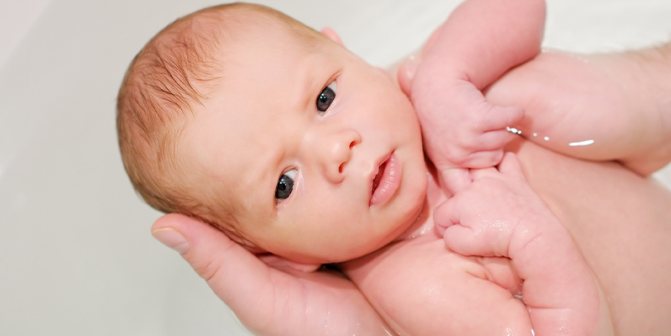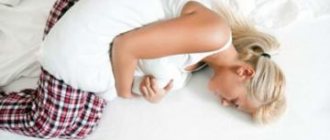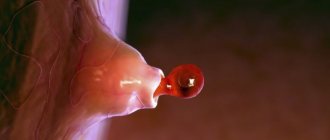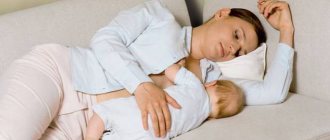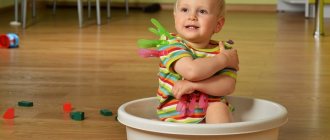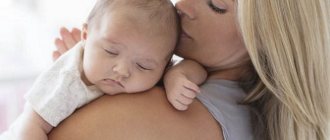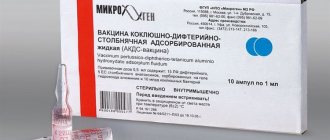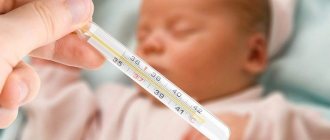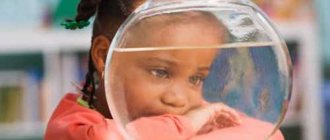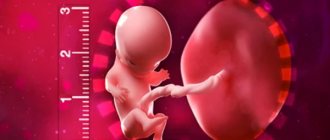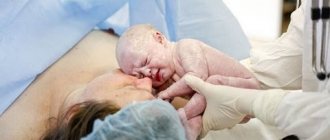What do you need at home after leaving the hospital?
The main requirement for a home is, of course, cleanliness. But this does not mean that the expectant mother, a few days before giving birth, should run around with a rag and wash every corner. On the contrary, doing this is strictly prohibited. In such a matter, you need to ask your husband for help, and best of all, your future grandmother or even two. Order needs to be restored when the woman in labor is in the maternity hospital, a couple of days before discharge.
The second necessary action is to prepare the children's room or, if this is not possible, a special place in the room. The room should be bright, spacious, and well ventilated. In addition, it is also necessary:
- Purchase a night light in advance, because... I have to get up more than once at night to feed the baby.
- Children's clothes should be kept separate from adults', so a chest of drawers for children's things will come in handy.
- Get a crib. The choice of cribs is very large: the variety of designs, colors and shapes is simply amazing. Which crib is best for your child is up to you to decide. The main thing is that the crib is a comfortable place for the child to sleep and spend time. Along with the crib, you need to choose a mattress. It’s not worth saving on buying a mattress, since the quality of the mattress will determine the health of your little one.
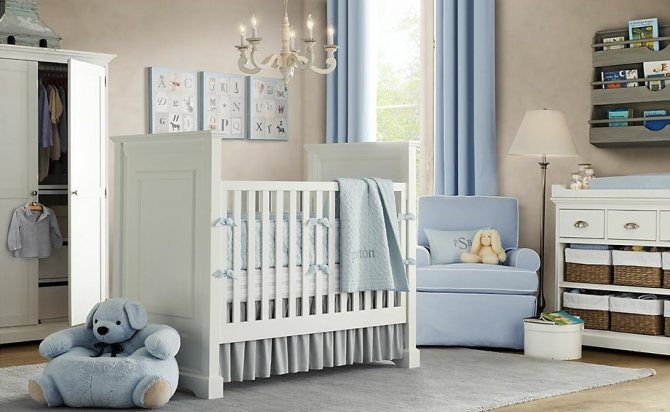
If the air in your home is dry (due to the heating season or for other reasons), it is best to purchase a special humidifier. Dry air has a negative effect on the baby; the nasal mucosa begins to dry out and a runny nose begins, which can easily develop into a chronic one. Therefore, you should not forget to monitor the air humidity in the room. You can, of course, try to do without a special humidifier. To do this you need:
- do wet cleaning every day
- ventilate the room more often
- you can place a large container of water near the battery or hang wet things in the room and on the battery
However, as practice shows, such methods are ineffective and short-lived.
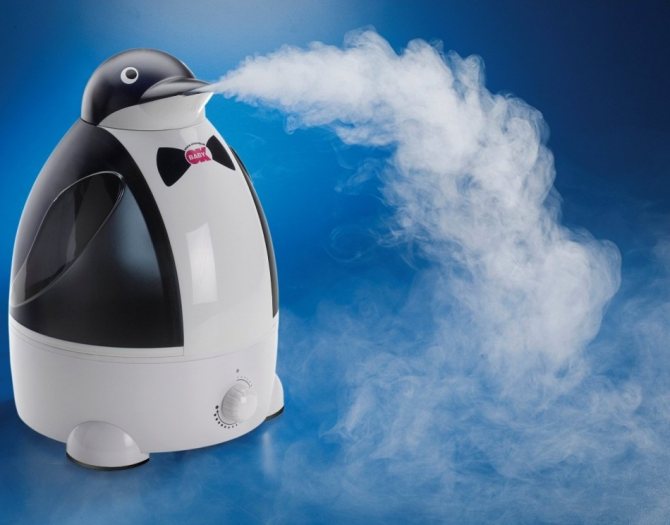
A few days before discharge
You need to take care of your arrival home even before discharge. Make a list of shopping and things that your husband needs to do before you arrive. Many women believe that their husband will do everything necessary without additional advice. But it is only obvious to you that any nursing mother needs black tea and milk, cottage cheese and boiled turkey, and any child needs a wet cleaning in the room and a crib... But even the most caring man can get confused, forget something or confuse something.
What does a newborn need after discharge from the hospital?
The list of necessary things for newborns can be very large and endless, but you can get by with a very modest list, which will include only the most necessary things.
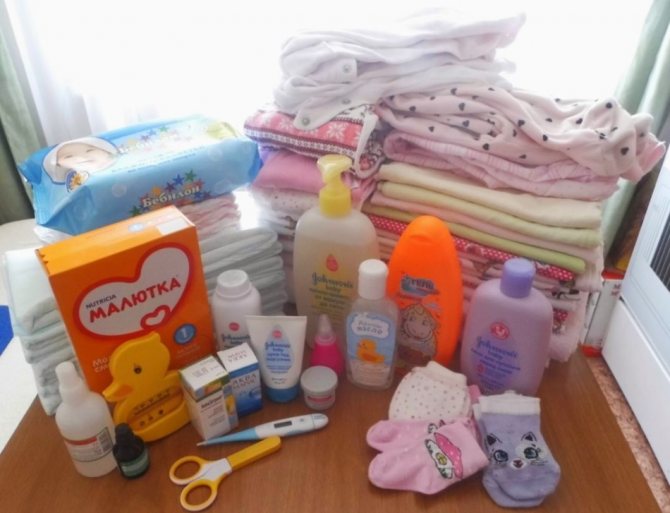
One way or another, the baby cannot do without the following things:
- A first aid kit, which must include brilliant green, hydrogen peroxide, potassium permanganate, sterile cotton wool, an anti-colic remedy (for example, espumizan, bobotik, plantex, etc.). The first aid kit can also be supplemented with a children's thermometer, an antipyretic for newborns, and a pipette.
- Baby skin care products. Modern industry offers a large selection of various creams, shampoos, powders, etc. The choice of products depends on the preferences of the parents, as well as the baby’s skin. Be sure to get diaper cream or powder and bathing product. However, you need to remember that you need to use the bathing product no more than 2 times a week. The rest of the time you need to bathe the baby in plain water, to which an infusion of chamomile or calendula has been added.
- Cotton pads, cotton swabs, wet wipes.
- Diapers (disposable or reusable, depending on the parents' choice).
- Diapers. Even if you are not going to swaddle your baby, diapers will always come in handy. There should be both warm diapers and regular ones. There is always a pressing question about the number of diapers. The minimum set is 4 warm and 5-7 regular. You just need to remember one rule: the fewer diapers you have, the more often you will need to wash them.
- A blanket for the crib and another for the stroller.
- Minimum 2 sets of children's bedding. Now you can also buy crib bumpers and canopies. However, in the first month of a baby’s life, the sides in the crib are not particularly necessary; on the contrary, they can only get in the way, covering the baby from the mother.
- The canopy is also a controversial item; it plays more of a decorative role, while at the same time collecting dust. Therefore, if a child suffers from allergies, it is better to refuse the canopy.
- Bath for bathing. Recently, you can come across the opinion that you can bathe in a regular bath, but in the first months a special bath will be more comfortable and safer for the child.
- Towel, nail scissors for baby.
- Stroller, child car seat.
- If the child is bottle-fed, you must also purchase 2 feeding bottles.
- Clothes for the baby. It is best to buy clothes that can be unbuttoned. Such clothes allow you to change your child's clothes most comfortably.
These are the main things you will need in the first days of your baby's life. Of course, the list can be expanded. It all depends on the wishes and wallet of the parents.
A rocking chair, a pacifier, a special slide for swimming, a water thermometer, etc. will be very useful. At about a month you can already buy bright toys and rattles. The main thing is not to panic and not to sweep away everything necessary and unnecessary from the shelves of children's stores. If you haven’t purchased something yet, you can always do it in the process.
What to do with a newborn at home?
As soon as you arrive home from the maternity hospital, relax with your baby. Take a shower and get a good night's sleep.
It’s a big mistake to gather all your relatives and have a feast on the day of discharge. After being discharged from the hospital, mother and child need rest to gain strength.
Organize a place where you will change your baby's diapers, change clothes, wash your baby - care after discharge will take up almost your time. Therefore, prepare in advance the place where you will care for the baby, place accessories on it - this way you will save time and effort.
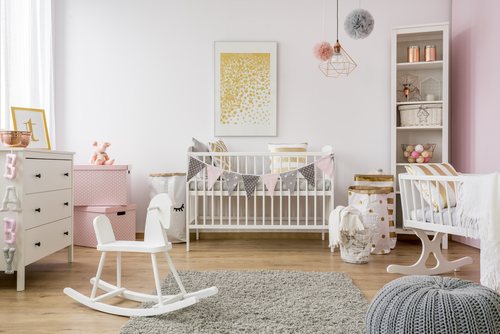
Rules for caring for a newborn
It seems to an inexperienced mother that caring for a baby is an incomprehensible science. The first few days at home you will have to learn a lot, but experience comes quickly. Here are some recommendations for caring for your child after discharge:
Change diapers - every 3 hours
Even if it seems to you that the diaper is not yet full, change it anyway. If you just changed a diaper and your baby immediately poops in it, change it right away. You need to remove the diaper from front to back.
Clean your ears - every day
For the first time after discharge, use cotton wool balls and Vaseline oil to care for your ears. Dip the ball a little in a small amount of oil and gently and shallowly clean the ears. There is no need to clean the ear canal to avoid injury.
Rinse your nose morning and evening
You will need a Humera-type saline solution, sea buckthorn oil, cotton wool, and a pipette. Make flagella from cotton wool.
Place 2 drops of solution into each nasal passage. Wait a little, then dip the flagellum in oil and insert it into the nostril with a twisting motion - this will remove the crusts and make breathing easier.
Treat your navel several times a day
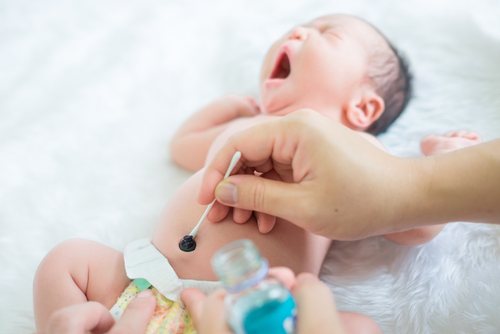
At the maternity hospital they will tell you how to care for her. First, thoroughly moisten a cotton swab with hydrogen peroxide and carefully treat the navel, then lubricate it with brilliant green. Baneocin powder also dries the wound perfectly - you need to sprinkle it on the wound in the morning and evening. Take care of your navel responsibly: do not let the wound get wet, make sure that the edge of the diaper does not cover the navel. Otherwise, it will take much longer to heal.
Trim your nails as they grow.
On the toes it is enough to do this even once a week, but on the hands you will have to cut it more often - children’s nails grow very quickly. The safest way to do this is with children's scissors. Do not try to cut the nails along the edges of the roller - they can grow in, the skin will become inflamed, and you will have to take the baby to a podiatrist. You need to cut in a straight line.
Wash your face every morning
Soak a cotton pad in warm boiled water and wipe the eyes - from the outer to the inner corner. A new disc for each eye. Use a separate disc to wipe the face, behind the ears, and neck.
Intimate care for son and daughter
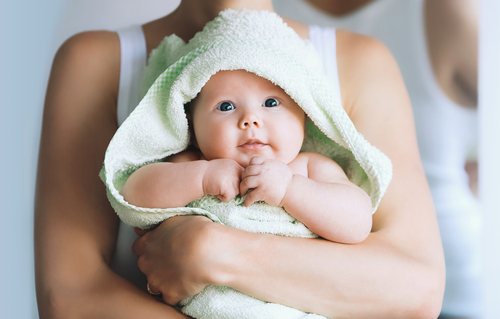
After each diaper change, the baby should be washed. Regular tap water is suitable for this. There are rules for washing:
Boys - from the bottom forward. To do this, bring your son to the sink, press his tummy to you and wash him. Do not pull or move the skin on the penis;
For girls, from the front to the butt. And nothing else! Do not allow dirt to get into the baby's genitals. Especially after defecation. Make sure that everything between the labia and the folds of the legs is clean.
After this, pat your body dry with a soft diaper and apply diaper cream or powder to the bottom, put on a diaper. Oil is not suitable for these purposes because it does not allow the skin to breathe.
When can you go for a walk after the maternity hospital?
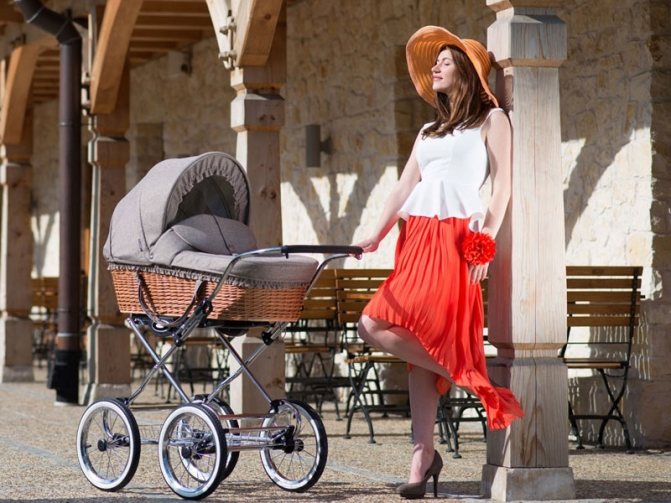
Walking is a necessary element of child care.
You can go for a walk the next day after discharge.
You need to start with 10-15 minutes, adding 5-10 minutes every day.
In summer, walks can last up to three hours, and you can walk several times a day.
In winter and during the cold season, the duration of the walk will depend on the air temperature.
It is recommended to walk down to minus 15 degrees.
It is important for the mother to dress the baby correctly, in accordance with the weather.
Inexperienced parents, trying to protect their child from colds, may dress him too warmly, which will cause the child to overheat. And the condition of overheating is even worse than hypothermia. To avoid such a mistake, you need to remember the rule: you need to wear as many layers of clothing as an adult plus one layer.
Features of newborn care
An important point is hygiene measures after discharge from the hospital. What do you need to know about this?
Firstly, from the moment of birth, babies need to be bathed every day. Even the first day after discharge should not be an exception. Soap is used no more than once a week. You need to buy a separate bath for your child. Do not forget that until the baby’s umbilical wound has healed, bathe in water with a small amount of manganese added to it (the color should be slightly pink) to disinfect the wound or in boiled water. In the first days after the maternity hospital, it is not advisable to add herbs to the water to avoid the possibility of developing allergic reactions.
The temperature of the bathing water should be within 36.6 C., and then it can be “adjusted” at the child’s request. How can you tell if the water is too hot for your baby or, on the contrary, too cold? The child shrinks into a ball if he is cold. In general, babies are extremely sensitive, therefore, as soon as they are cold, the nasolabial triangle first appears blue, and after some time the baby begins to tremble. If the baby is very hot or the bathing temperature is too high, the skin begins to redden, he becomes lethargic and begins to cry. There is no need to worry too much if the water temperature is above 36.6C. It is easy to adjust the water temperature and make it comfortable for the baby, and after a few baths you will accurately pour water at a temperature that the baby will like.
ATTENTION! The first days of a child’s life are the most important, they are called the newborn period. Its duration is 28 days. It is at this time that the child adapts to life in the new world, parents try to learn to understand his needs and desires. During this difficult time, it is important to be attentive to your baby.
Be sure to examine your baby’s skin every day. Parents may notice different rashes. If you see whiteheads on your face, there is no need to worry - this is a hormonal rash. Red rashes may indicate a possible allergy. You should definitely inform your pediatrician about this. A nursing mother needs to reconsider her diet and exclude allergenic foods. Skin care products can also trigger an allergic reaction.
Care in the first days of a baby’s life includes maintaining comfortable external conditions: humidity and temperature. Within normal limits, humidity should be at least 50% and temperature within 21-22°C. In winter, this is more difficult to achieve, because the housing is heated by radiators. For this purpose, many mothers buy special air humidifiers. Normal humidity levels will also help maintain outdoor aquariums.
What to do when a newborn cries?
All children cry, and that's normal. How else can you tell them about your little problems? “My baby didn’t cry in the maternity hospital, but now he’s crying all the time,” mothers complain. That's right, for the first two days the child sleeps off the difficult birth. There is an observation that for each problem (pain, boredom, hunger) the child has its own timbre and intonation of crying, and mothers quickly learn to understand them. However, if the parents cannot cope, then you can call a specialist for a detailed explanation of how to care for the baby, how to feed and bathe.
Make yourself comfortable
What should the temperature be in the nursery?
From 18 to 22°C. Install a thermometer in your baby's room and monitor its readings. Very young children are very sensitive to external conditions, and especially to temperature changes. Be careful!
What about air humidity?
From 50 to 60%. The most common problem is too dry air in the nursery. If you are faced with this situation, try to quickly correct the situation (using special humidifiers or tried-and-true “grandmother’s” remedies like a basin of water). The fact is that dry air disrupts the baby's breathing, drying out the mucous membranes.
Where is the best place to put a crib?
Away from windows, radiators, heaters. It is very important to protect the little one from drafts and overheating. By the way, if you want to heat the air in the nursery, use only closed oil heaters, they are safe and do not burn oxygen.
Bathing a newborn
Newborns do not need daily bathing during their first days at home, but facial and genital cleansing is done every morning or evening and as needed. Water procedures in the bath are practiced 3-4 times a week. The water temperature should be no higher than 37°C, the air temperature in the bathroom 22-24°C. Baby shampoo and gel from “0+” are used as desired. After bathing, it is permissible to use a moisturizing baby cream. The cream will protect delicate skin from damage, feces and urine, preventing diaper rash. An alternative to cream is natural olive oil, which is also useful for massage.
What does a newborn baby need at home to sleep comfortably?
First, you need to decide in which room the child will sleep. In the first days of a baby's life at home, it is especially important that parents can quickly come when he calls them. For this reason, most moms and dads install a crib in their bedroom. In some families, a separate children's room is equipped in the house or apartment for a newborn, and communication with it is ensured using a baby monitor. This option has its advantages, for example, you do not have to compact the layout of the marital bedroom or give up the habit of sleeping with an open window. However, a baby monitor, like any household appliance, can fail unexpectedly, so it is important for you to make sure that you can hear your baby's cry even through the door.
If you think the room needs renovation, try to do it early. When a newborn baby is at home, there should be no smell of paints and varnishes, and some chemical odors can take weeks to dissipate. Construction dust is also harmful to the baby, as it is almost impossible to remove at one time, and may require two or three cleanings with a break of several days.
So, the room is ready. Now you need to find a place for the crib with an ideal microclimate - with good ventilation and lighting, but without drafts, direct sunlight and not near the battery1. It is advisable that from the crib you can observe what is happening around - this way the baby will begin to explore the world immediately after the maternity hospital.
What else should be prepared at home for a newborn's sleep?
Blanket
Immediately after the maternity hospital, the baby will need a blanket, there should even be two of them - for warm and cold weather. However, you can do without blankets at all. Today, sleeping bags for infants are becoming increasingly popular2. They do not restrict the baby's movement and are often all-weather: in winter the bag is used with sleeves, and in summer they are unfastened.
Bed sheets
The bedding essentials for a newborn at home are a sheet and a duvet cover, but if you plan to use a sleeping bag, you only need to buy sheets. On the baby’s first day at home, and even in the first year after the maternity hospital, the baby not only does not need a pillow, but is even harmful. While the baby's vertebrae are mobile, he must sleep on a flat surface, otherwise he risks getting a curvature of the spine. Also, the pillow can block the baby's airway, which is very dangerous3. Accordingly, you don’t need to buy pillowcases yet.
The baby should have at least two sets of bed linen - he sleeps on one while the second is washed or dried. However, in case of unforeseen circumstances, it is better to have a small reserve.
Night light
A night light can come in handy if your baby is afraid to sleep without light, and this is a fairly common occurrence. Do not turn on the night light in the first days of the newborn at home; there is no need to specially teach the baby to sleep in the light. Only start using it if you notice that your baby is fussy and crying in the dark. This device can be purchased at a children's goods store, but any “adult” lamp with adjustable brightness will also work.
Thermometer
The temperature of the home for newborns should be maintained between 18–22 °C4. It is difficult to estimate the temperature based on your own feelings, so buy a thermometer. He will give an exact answer to the question of what to do at the moment - heat the room or cool it. When the apartment is cool, use an electric heater; when it is hot, open the window or turn on the air conditioner. But if you feel that air currents are reaching the crib, you will have to abandon automatic air conditioning. Switch to manual mode: take the baby out of the room, cool it, turn off the air conditioner (close the window), bring the baby back, repeat as necessary.
It's even better if, in addition to the thermometer, you buy a hygrometer - a device that shows humidity. There are weather stations that combine both functions. Heating appliances dry out the air a lot, and this is not what is needed after the maternity hospital. To create a comfortable environment for your baby at home, buy an air humidifier or use traditional methods - a spray bottle, wet towels on a radiator, etc.
